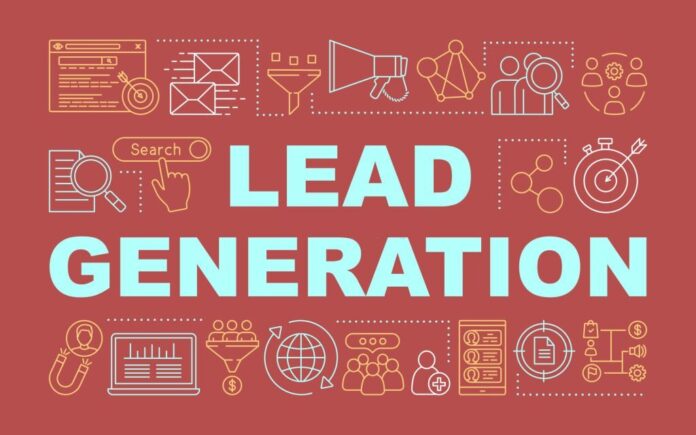Leading Generation Strategy plays a pivotal role in driving the success of any business. Without a steady stream of leads, growing and expanding your customer base becomes challenging. In this article, we will discuss the 4 Steps For Leading Generation Strategy
What does leading generation mean?
lead generation is a fundamental aspect of business growth, involving the art of capturing and converting potential customers into valuable leads. These leads are individuals who have expressed a genuine interest in your products or services. A well-executed lead generation strategy helps businesses to capture relevant leads, nurture them, and ultimately convert them into paying customers.
Why do you need a leading generation?
When a stranger forms a relationship with you and shows a natural interest in your business, the transition from stranger to customer is much more natural.
lead generation is part of the second phase of the inbound marketing methodology. This is when you’ve attracted an audience and are ready to convert them into leads (aka sellable leads) for your sales team.
As the diagram below shows, lead generation is a crucial step in an individual’s journey to becoming a satisfied customer.
Step 1: Define Your Target
Defining your target audience is a critical first step in developing an effective Leading Generation Strategy. By understanding who your ideal customers are, you can tailor your marketing efforts to reach the right people with the right message.
Once you have gathered the necessary information, it’s time to create a detailed profile of your target audience. This profile should go beyond simple demographic information such as age, gender, and location. It should also encompass psychographic details, including their interests, values, motivations, and pain points.
To create accurate buyer personas, consider conducting surveys, interviews, or analyzing existing customer data. This information will provide valuable insights into your target audience’s preferences, challenges, and motivations. By delving deep into their needs and desires, you can develop marketing strategies that resonate with them.
Step 2: Create Compelling Content
Once you know who your target audience is, it’s time to create compelling content that attracts and engages them. Develop a content marketing plan that aligns with your target audience’s needs and preferences.
This could include blog posts, videos, infographics, eBooks, or webinars. The key is to provide valuable information and solutions that address your audience’s pain points. By offering valuable content, you establish yourself as a trusted authority and build credibility with your potential leads.
Step 3: Optimize for Search Engines
In today’s digital landscape, search engines are vital in driving organic traffic to your website. To ensure your content reaches the right audience, you need to optimize it for search engines. Conducting thorough keyword research is a vital step in developing a highly effective lead generation agency By identifying and incorporating relevant keywords naturally into your content
Additionally, optimize your website’s meta tags, headings, and URLs. By implementing effective search engine optimization (SEO) techniques, you increase your visibility in search engine results, making it easier for potential leads to find you.
Step 4: Nurture Leads
Generating Leading Generation Strategy is just the first step; nurturing them is equally important. Implement a lead nurturing strategy to build relationships with your leaders and guide them through the buying journey. Use marketing automation tools to send targeted emails, personalized offers, and relevant content to your information.
This helps keep your brand top-of-mind and allows you to stay engaged with potential customers. Continuously analyze the data and feedback you receive from your leads to refine and optimize your nurturing efforts.
Why not just buy leads?
marketers and sellers want to fill the sales funnel fast. Type: the temptation to buy leads.
First, the leads you buy don’t really know you. Typically, when they sign up for a website, they have “decided” on something and not actually agreed to receive anything from your company.
The messages you send them are therefore spam and sending spam is a hassle. (Remember that annoying phone call when I was trying to eat spaghetti? That’s how people feel when they get emails and other messages from people who didn’t ask to be contacted.)
If a potential customer has never visited your website and has not shown any interest in your products or services, simply unsubscribe.
If they’ve never consented to receiving messages from you, they’re probably marking your messages as spam.
If enough people mark your messages as spam, you end up on a “blacklist” which is then shared with other email providers. Once you’re blacklisted, it’s really hard to get out. Email delivery and IP reputation will also likely suffer.
It’s always, always, always better to generate leads organically than to buy them. Read this blog post to learn how to build an email list to join instead of buying one.
Conclusion
Developing a successful Leading Generation Strategy requires a systematic approach. By following these four steps – defining your target, creating compelling content, optimizing for search engines, and nurturing leads – you can establish a solid foundation for generating high-quality leads.
Remember, lead generation is an ongoing process that requires constant monitoring and refinement. Adapt your strategy based on the evolving needs and preferences of your target audience to ensure long-term success.






